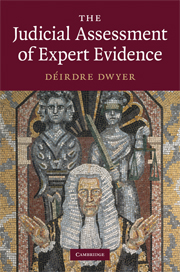Book contents
- Frontmatter
- Contents
- List of figures
- Preface
- Table of legislation
- Table of cases
- Introduction
- 1 General epistemological issues
- 2 Expert evidence as a special case for judicial assessment
- 3 Making sense of expert disagreement
- 4 Non-epistemological factors in determining the role of the expert
- 5 Assessing expert evidence in the English civil courts: the sixteenth to twentieth centuries
- 6 Assessing expert evidence in the English civil courts today
- 7 The effective management of bias
- Conclusion
- Appendix 1 Part 35 of the Civil Procedure Rules 1998
- Appendix 2 Tables of pre-1800 civil cases involving expert evidence
- Bibliography
- Index
- References
4 - Non-epistemological factors in determining the role of the expert
Published online by Cambridge University Press: 01 July 2009
- Frontmatter
- Contents
- List of figures
- Preface
- Table of legislation
- Table of cases
- Introduction
- 1 General epistemological issues
- 2 Expert evidence as a special case for judicial assessment
- 3 Making sense of expert disagreement
- 4 Non-epistemological factors in determining the role of the expert
- 5 Assessing expert evidence in the English civil courts: the sixteenth to twentieth centuries
- 6 Assessing expert evidence in the English civil courts today
- 7 The effective management of bias
- Conclusion
- Appendix 1 Part 35 of the Civil Procedure Rules 1998
- Appendix 2 Tables of pre-1800 civil cases involving expert evidence
- Bibliography
- Index
- References
Summary
4.1 Introduction
An explanatory theory of evidence generally, or expert evidence specifically, might be concerned solely with identifying arrangements that are optimal for accurate fact determination. However, evidential arrangements are inextricably linked to non-epistemological questions about the political, moral and cultural values that ought to be promoted through the procedural activity of fact finding. In Chapters 1 to 3, I explored the extent to which it can validly be said that the non-expert tribunal of fact is epistemologically competent to assess the evidence of experts. I proposed a basis for such competence, based on a common set of evidential techniques. Any account of how the court descriptively does, or normatively should, approach the assessment of expert evidence should be given in the context of this theory of limited epistemic competence. It is both a necessary preliminary point, to demonstrate that the court is able to assess expert evidence, and an analytical framework within which to think about the fact-finding effectiveness of various approaches to presenting and assessing expert evidence.
Alongside this epistemological account runs an understanding of the non-epistemological factors that contribute to defining expectations of the role of the expert, held by those involved in the litigation process. These factors may shape both the normative procedural provisions for the way in which experts are to be used, and the way in which parties and the experts themselves act within the context of those provisions.
- Type
- Chapter
- Information
- The Judicial Assessment of Expert Evidence , pp. 180 - 237Publisher: Cambridge University PressPrint publication year: 2008



